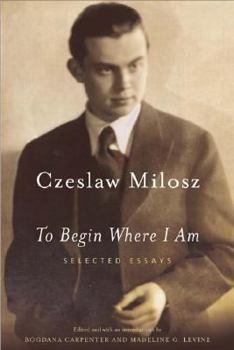To Begin Where I Am: Selected Essays
Select Format
Select Condition 
Book Overview
A comprehensive selection of essays--some never before translated into English--by the Nobel Laureate. To Begin Where I Am brings together a rich sampling of poet Czeslaw Milosz's prose writings. Spanning more than a half century, from an impassioned essay on human nature, wartime atrocities, and their challenge to ethical beliefs, written in 1942 in the form of a letter to his friend Jerzy Andrzejewski, to brief biographical sketches and poetic prose...
Format:Hardcover
Language:English
ISBN:0374258902
ISBN13:9780374258900
Release Date:October 2001
Publisher:Farrar Straus Giroux
Length:480 Pages
Weight:1.80 lbs.
Dimensions:1.5" x 6.4" x 9.3"
Customer Reviews
3 ratings
To Begin Where I Am
Published by Thriftbooks.com User , 15 years ago
this book had some insightful essays by Milosz, like his poetry, his essays were engaging, interesting, an off-angle point of view
Elegant and Sophisticated Prose
Published by Thriftbooks.com User , 22 years ago
I highly recommend this volume to anyone. Along with his recently published New and Collected Poems(Ecco Press), Milosz stands tall as one of the most accomplished writers in the modern era. This volume of essays is highly personal and eloquent. His prose style is immediate and vivid, capturing insights of history and the "poetic." His work on Jeffers is remarkable. This is a poet of our time--his thought triumphs over despair and the ills of the human condition. He has witnessed some of the most deliberate atrocities in world history--his essays evoke a wisdom based on personal remembrance-and there is no better vision of our predicament than what is offered here.
A Poet's Religious Humanism
Published by Thriftbooks.com User , 23 years ago
Czeslaw Milosz is a renowned writer of both poetry and prose. He received the Nobel Prize for literature in 1980. In his long life, he has seen and written about many of the events of the Twentieth Century, including the Russian Revolution, the Holocaust, the Warsaw Uprising, and the rise and fall of communism. He served as a diplomat from Poland to the United States following WWII. Among his books is an incisive critique of communism titled "The Captive Mind". "To begin where I am" is a selection of Milosz's essays published between 1942 and 1998, some written initially in English, but most written in Polish. The essays are wide-ranging in theme and capture a great deal of the scope of Milosz's passions. The good introduction to the book by Bogdana Carpenter and Madeline Levine point out that Milosz "has centered his writings on a few fundamental philosophical questions: the meaning of history; the existence of evil and suffering; the transience of all life; theascendance of a scientific worldview andthe decline of the religious imagination." The essays are well-arranged into four main sections.The first group of essays titled "These Guests of Mine" is primarily historical and descriptive in character. I enjoyed particularly Milosz's description of Wilno(Vilna) in his "Dictionary of Wilno Streets."For me the heart of the book is in the second and third parts, titled "On the Side of Man" and "Against Incomprehensible Poetry." We learn a great deal about a writer by his discussions of those who have influenced him. In this book,Miloscz's essays on the American poet Robinson Jeffers, on the Russian philospher Lev Shestov, and on the French theological thinker Simone Weil are highly thoughtful. They reveal a writer both struggling for a commitment to religion, to Catholicism in particular, in the face of a scientific and material worldview which he finds inconsistent with it, and a writer committed to humanism, to the best in man and culture. They are an inspiring and difficult set of commitments, and Milosz discusses them eloquently.In Part 3 of the book, the centerpiece is the title essay "Against Incomprehensible Poetry". In this essay, Milosz develops insights from W.H. Auden and makes them his own. Auden had said "there is only one thing that all poetry must do,it must praise all it can for being and for happening." (p.381). This insight becomes the basis of a critique of much obscurantism in modern poetry. We are privileged to hear, in the book, a discussion of the continuing value of poetry and informed discussion of many poets worth knowing, from Whitman, Blake,and Jeffers to many of Milosz's Polish contempories. These latter writers are unknown to me, but Milosz makes one wish for them as companions through his discussions.The fourth part of the book. "In Constant Amazement", is brief and consists of a collection of aphorisms. The aphorism I found most striking discusses the nature of human sexuality. It begins: "Men and wome






